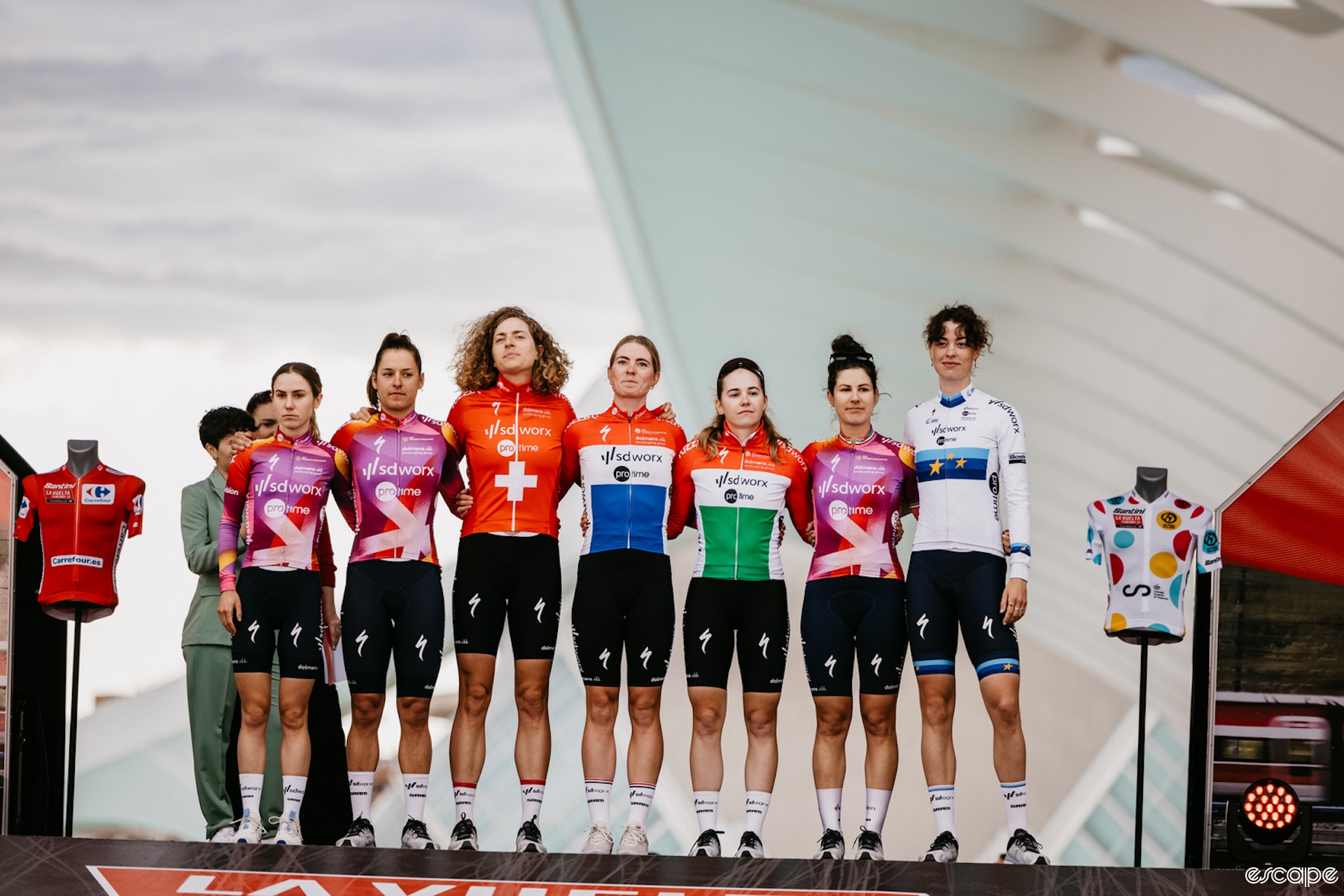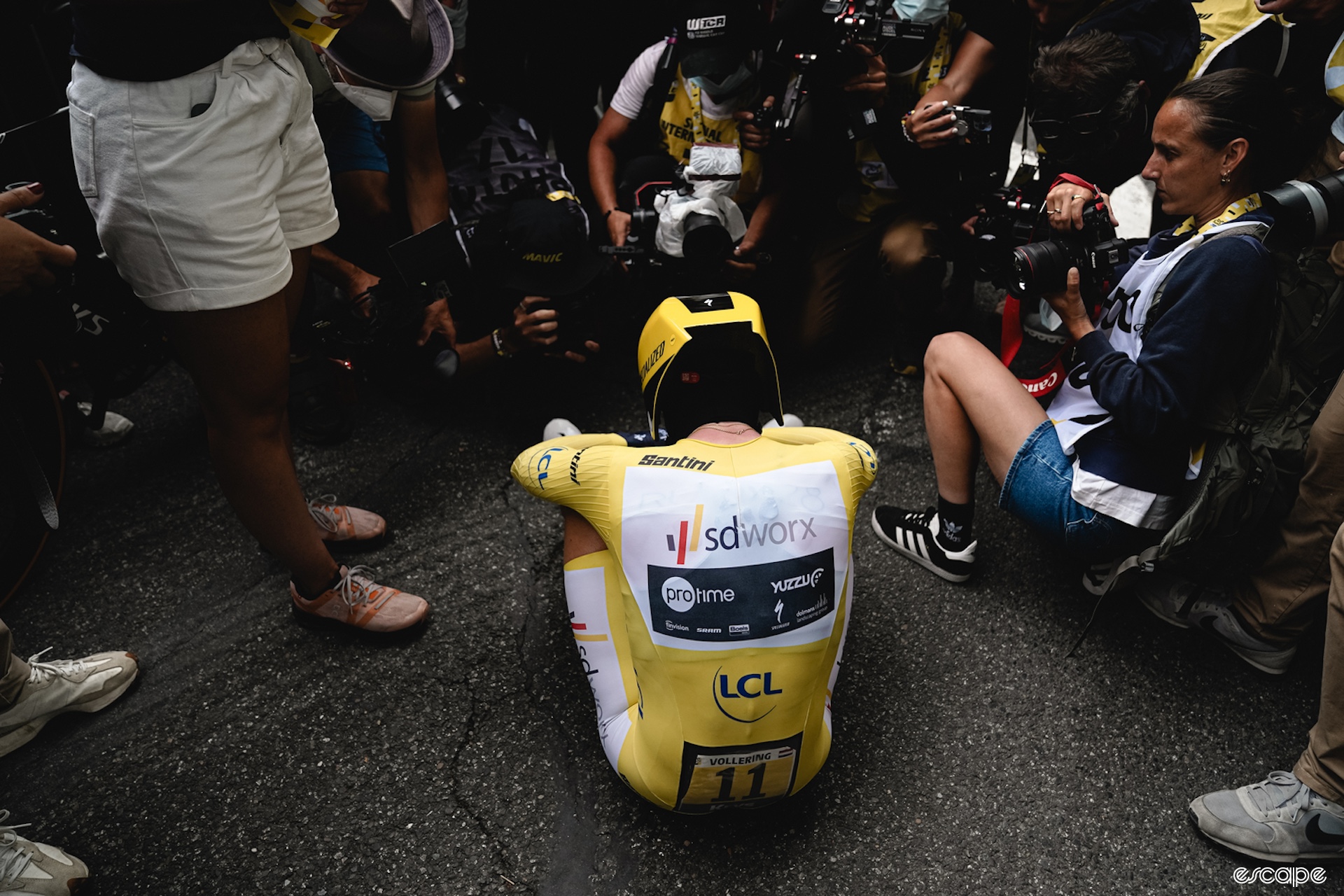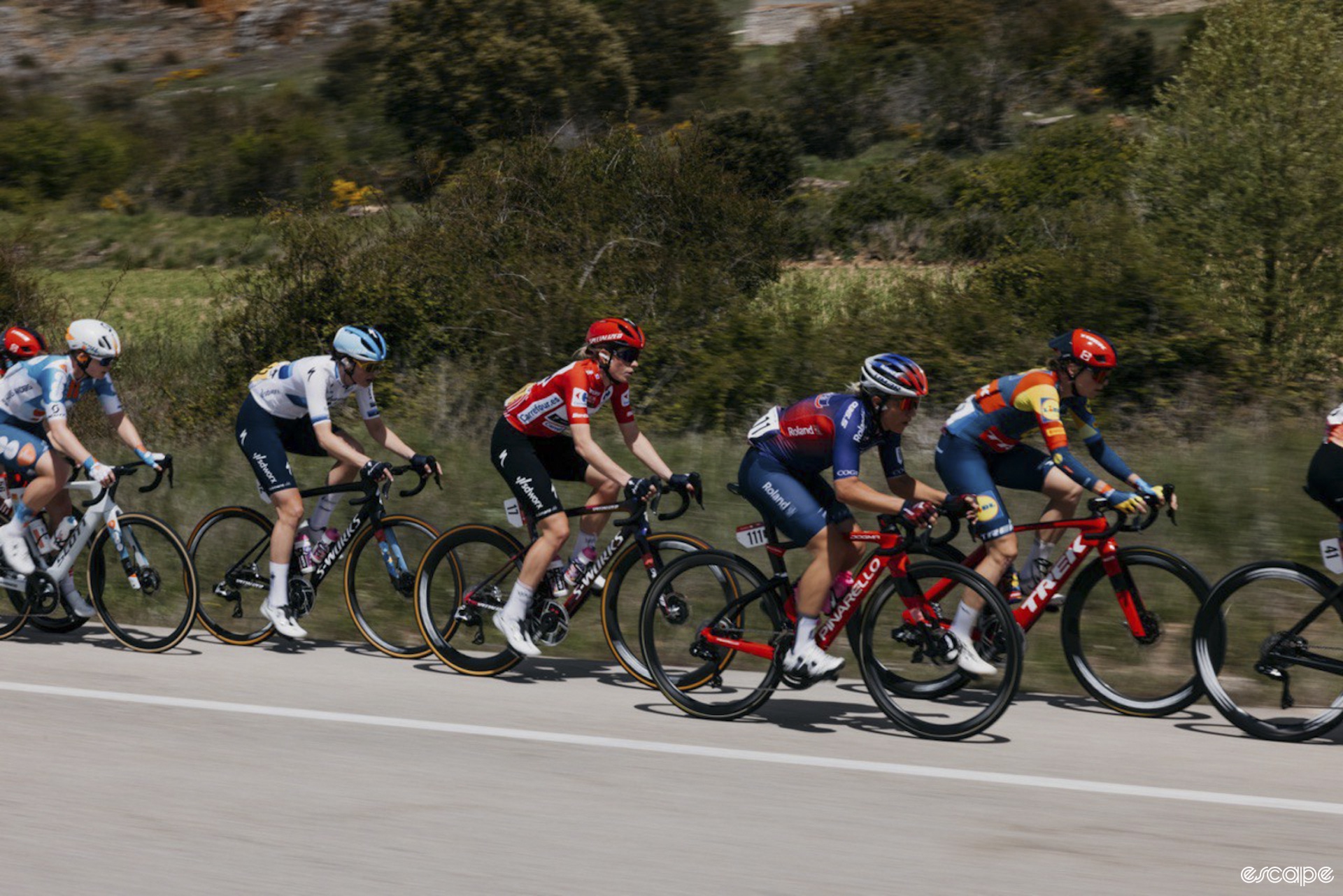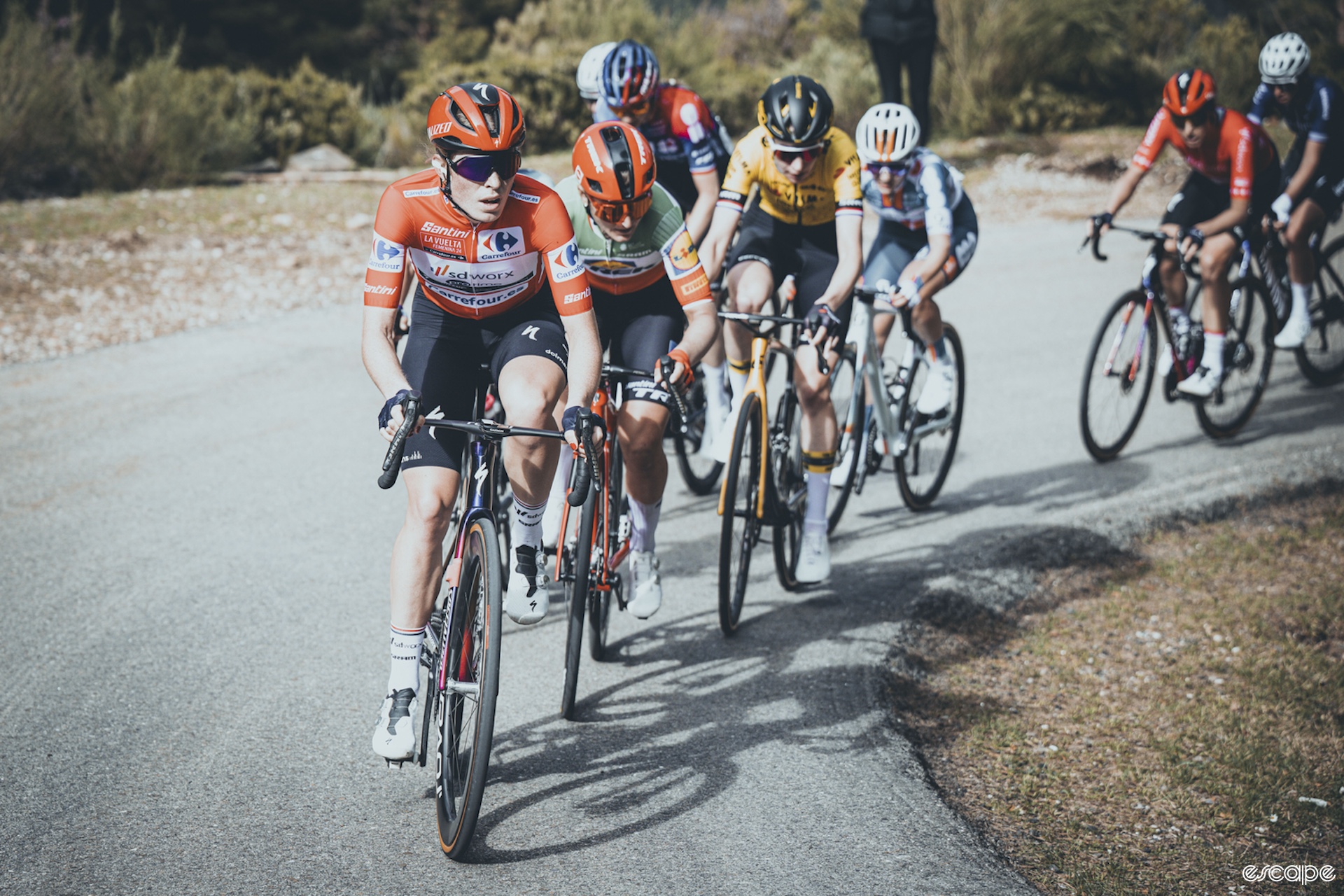It's been a weird year, news-wise, for SD Worx-Protime but things keep getting weirder.
On Friday stage 6 of La Vuelta España Femenina, the casual viewer would have been forgiven for feeling confused on watching red jersey-wearer Demi Vollering pacing a fractured group up the final climb to the finish. Watch for a short period of time and you see an eager, talented climber leading a group of competitors in a bike race. But every so often, more so than is normal, Vollering was on the radio, looking around. She appeared confused, and a lot of viewers felt the same. In the group behind Vollering sat two of her SD Worx-Protime teammates Marlen Reusser and Niamh Fisher-Black, perhaps too on the limit to move to the front and take over for Vollering, or perhaps riding with other goals in mind.
Had it been any old climb it may have made more sense for Vollering to be on the front. She is the strongest climber, she would put the most pressure on the remaining riders. But on this particular climb the riders were battling with a headwind, so it took more energy to get to the finish.
It's important to note that her teammates did do some work on the front for the race leader prior to that final grind, so she wasn't left out on her own all day, but the energy Vollering used riding in the wind at the head of the group possibly cost her a stage win, even if it didn't impact her general classification hopes.
But the scenes on Friday raised more questions about the intra-team dynamics over at SD Worx-Protime. After all, it's not the first time this year we've seen Vollering riding her own race.

It all started when Lotte Kopecky hinted she was considering leaving the team only to turn around and announce she'd signed a lengthy contract to stay. Immediately, talk turned to her teammate and Tour de France winner Demi Vollering, whose contract is also up in December. After a bit of speculation, it was one of the team's long-time directors Danny Stam who confirmed the Dutch national champion would leave the team at the end of 2024. As of May, with Vollering in the red jersey at La Vuelta España Femenina, more speculation about the team's inner workings is running rampant.
Questions about the team's handling of Vollering's departure centre on decisions made long before the sixth stage of La Vuelta. Stam's statements to the press about not wanting to pay a "blank cheque" to keep the Tour winner were a little offputting, to start. For Stam to announce Vollering was leaving, so early in the season, was odd. A week before La Vuelta another high-ranking member of SD Worx-Protime told the press that Vollering was potentially headed to FDJ-Suez. Meanwhile, the rider in question has been almost completely silent on her future, except for when she announced a new deal with Nike.

On the road, the cracks started to show when Vollering and Kopecky were held up on the Koppenburg during the Tour of Flanders. Once the two had remounted their bikes they were just over half a minute down on the front of the race, and they would regain contact only to lack the legs to follow the winning move with Elisa Longo Borghini and Kasia Niewiadoma on the final ascent the Paterberg. In the end, they finished 5th and 8th, a far cry from their dominant 1-2 of 2023.
It could have been a one-off. With Kopecky on such good form all spring and Vollering coming in from an altitude camp, who's to say which of the two was the stronger? In the past, SD Worx-Protime has always gotten away with off-brand tactics because with the strongest riders in the race they still often manage to pull off the win.
At La Flèche Wallonne, Vollering on multiple occasions followed moves she shouldn't have needed to follow, while Kopecky also seemed to be riding her own race separate from her teammate, and by the end, Vollering was pace setting on the climb from the base of the ascent, which left her empty and unable to respond when Kasia Niewiadoma attacked. In this case, the team was down Niamh Fisher-Black who crashed with 10 km to go, which would have impacted the finale.
Again at Liège-Bastogne-Liège, Vollering was seemingly riding solo for a large part of the race. At times it looked like she was either not getting enough information from the car, or over-calculating her form. It wasn't the work she did that lost her the win in Liège, but poor positioning going into the sprint – but cycling is a head game. When everyone is doing similar preparation, riding the same course at the same time in the same conditions, the difference is made up in team tactics and mentality.
So with all these little moments in mind, the fifth and sixth stages of La Vuelta paint a picture of a team at odds with their leader. A year ago, we would have seen Reusser and Fisher-Black in front of Vollering, sacrificing their own results for the team's goal of winning the race with the Dutchwoman. Had either of them finished higher up in both of the mountain stages so far the argument could be made that the team was hoping for multiple cards to play, but that argument is a bit less sound when your rider is in the lead, and poised to take more time had things gone differently.

To be clear, no blame should be placed on the teammates of Vollering, who are also just trying to do their jobs. Both Reusser and Fisher-Black are out of contract at the end of the season, both are riding with their careers in mind. Decisions made in these scenarios normally come from the person driving the car, the team's director.
And what if Vollering hadn't ridden on the front? Then the riders in that group would have had ample opportunity to attack, and Vollering would have been the one covering the moves. By riding the front and expending that energy, she was controlling the race, but she didn't have to be the one doing that, that's what teammates are for.
From the statements made by the team, it's clear they aren't too thrilled with the career path their former protégée is on, but given the option, they chose Kopecky over Vollering – they said the quiet part out loud. When it comes time for contract extensions and announcements we often see team dynamics shift slightly; riders who are leaving teams can sometimes be left off rosters for big races, even if they would have been an asset to the team. You'd hope with the growing professionalism of the sport this wouldn't be the case, but it's hard not to wonder as Vollering pleads hopelessly into the radio while leading La Vuelta.
Each moment the team has left Vollering to fend for herself could be written off in isolation, but as they continue to mount up, scrutiny of the team's treatment towards the Tour winner will only get louder, and each moment will be picked apart.
Perhaps everything will become clear soon, and the situation during stage six was just miscommunication, but if it smells like a duck and walks like a duck ... All we can hope is that Vollering's contract negotiations are sorted soon and the Dutch national champion can focus on her job, but by golly, the SD Worx-Protime team bus can't be a fun place to hang out at the moment.
Did we do a good job with this story?



